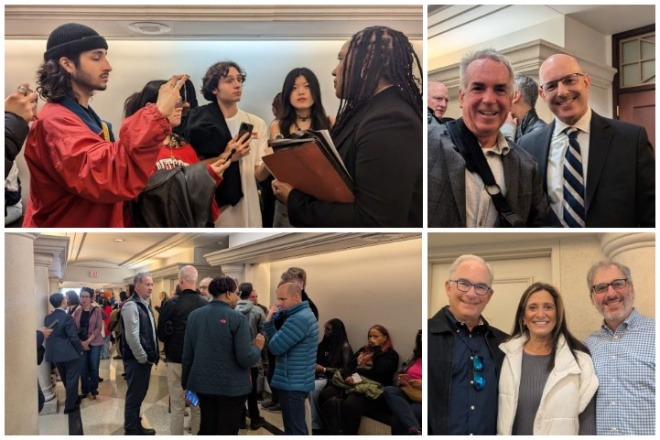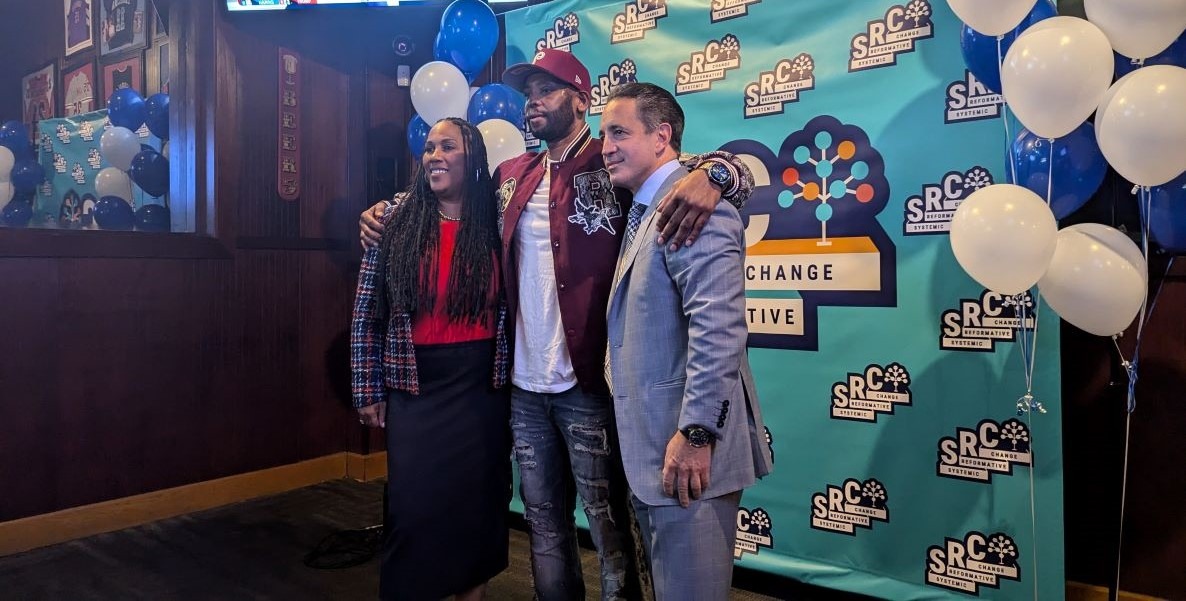After more than 26 years, Tyree Wallace is a free man.
Convicted of murder — despite no physical evidence, recanted witness testimony, and questionable behavior from prosecutors and police — Philly native Wallace has claimed his innocence since his arrest in 1997. In December, his defense team filed a new Post-Conviction Relief Act Petition that proved a major breakthrough in his decades-long fight. In June he agreed to plead guilty to third-degree conspiracy to commit murder.
And on Monday of this week, Wallace sat before Judge Scott DiClaudio, who ran through the math on his resentencing for the guilty plea, putting his maximum sentence at one month and 10 days under the time Wallace had already served. “Accordingly,” DiClaudio announced, “I’m directing the Bureau of Prisons to immediately release you. Today.” Then he banged his gavel.
The courtroom — filled with supporters, including legendary sports reporter Michael Barkann and his whole family, Penn Professor Mike Butler, Fountain Fund director Tom Duffin, Temple University students and professors, local nonprofit leader Darren Sudman, local business leader Jay Coen Gilbert and a large contingent from Coen Gilbert’s White Men for Racial Justice — erupted in cheers, shouting, whooping, and tears.
It was a bittersweet victory: Though Wallace is now free to live his life on the outside, continue his community service, and build his nonprofit organization, he must still work to clear his name. Why would he plead guilty to a lesser charge in a crime he says he didn’t commit? And what happens now?

How did we get here?
Jhon Su Kang, owner of Point Breeze’s Salt & Pepper Deli, was killed in an armed robbery on October 27, 1997. Wallace, 19 at the time of the crime, was sentenced to life in prison alongside a 17-year-old co-defendant, while a third defendant pled guilty to lesser murder charges. There was no physical evidence tying Wallace to the crime: no fingerprints, no weapon nor ballistics, no footage, no DNA, no recovered money. He didn’t even match the description of the shooter.
At the time of Jhon’s murder, Wallace was a 19-year-old who had occasional brushes with the law. He also knew the victim well. When he discusses his case, he makes a point to remind people who Jhon was. “He was a giant in the community,” Wallace explains. “He hired from the neighborhood, and if he saw you were hungry, he would feed you.” He says it adds insult to injury that he was convicted of killing a man he admired so much.
The entirety of the prosecution’s case was three witnesses, all of whom have since recanted, and one of whom did so during the trial, on the stand. The prosecutor, then-Assistant District Attorney Yvonne Ruiz, told the jury during closing arguments that the witness was afraid of the defendant.
Ruiz was one of 33 ADAs fired by Larry Krasner in 2018. Detective Jeffrey Piree, one of the detectives on the investigation into Jhon’s killing, faces multiple civil suits for misconduct.
Wallace spent his time in prison volunteering for inmates in hospice care; co-founding a chapter of the Pennsylvania Lifers Association at SCI Huntingdon; co-founding Mann Up, an organization that assists men preparing for release to successfully acclimate to civilian life; and finally founding the nonprofit SRC (Systemic Reformative Change Organization), which has an ambitious civil rights and criminal justice reform agenda.
He also fought to have his conviction overturned — until recently, to no avail. Most criminal appeals must be filed within 30 days, but the Pennsylvania Post Conviction Relief Act (PCRA) allows challenges to a conviction or sentence for up to one year when direct appeals have been denied for issues like ineffective counsel, violation of constitutional rights, or legal errors committed during the trial, with narrow exceptions. (This is known as the “time bar.”) Exculpatory evidence must be newly discovered, meaning it wasn’t known at trial and would have affected the outcome.
To file appeals, Wallace, like most inmates, was limited to the prison library, letter writing, and recruiting attorneys looking for a way to rack up pro bono hours. He filed several PCRA petitions on his own, which were denied based on procedural and technical flaws. The team behind him now is led by David Perry of Blank Rome and former Philadelphia Chief Defender Keir Bradford-Grey, who recently joined Philly’s Marrone Law Firm.
“When we don’t allow ourselves to be divided with superficial constructs, we don’t allow ourselves to be separated as a result of antiquated thought processes, they can’t stop us from doing anything.” — Tyree Wallace
Their first PCRA hearing was held February 20, 2024, in front of dozens of supporters who cheered as Wallace’s case was called. The filing summarized what had gone wrong during the trial, much of which was now “time-barred,” the lack of physical evidence, the witnesses recanting their testimony, the failures of Wallace’s counsel, investigative findings of the PA Innocence Project, and allegations of police and prosecutorial misconduct.
The alleged shooter has spoken out about his involvement in the crime and unequivocally stated that Tyree Wallace was not involved in any way, but he would not voluntarily testify under oath. And finally, the prosecution’s failure to turn over documents to the defense pertaining to deals made with their cooperating witnesses is what’s known as a Brady violation. (Those records are long gone, reported as “missing” by the DA’s office.)
Paul George and Steven Wildberger stood for the DA’s office. The judge took the time to speak to the gallery, explaining what to expect in the process to Wallace’s supporters, acknowledging the attention the case had garnered, and noting that the defense and DA’s office were working together. “That’s really good for the defendant,” he said.
At the next hearing, on May 14, Wallace’s supporters learned a likely plea deal was in the works rather than a new trial or the exoneration they had been advocating for. On June 10, supporters packed the courtroom again. After a tense wait, Wallace was brought in around noon.
Judge DiClaudio announced that the Commonwealth and the defense team had come to an agreement on vacating the second-degree murder charges, with Wallace pleading guilty to a lesser charge. Judge DiClaudio reiterated the legal issues and what was presented in the PCRA petition, stating, “You can read between the lines. This is the best you’re gonna get. Everyone knows what’s up.”
Then, with a bang of his gavel, “I am vacating your conviction, and I am vacating your sentence.”
After a collective gasp and thick silence, Tyree Wallace pled guilty to conspiracy to commit murder in the third degree. A pre-sentencing report took 90 days, and resentencing — originally scheduled for September 14 — finally took place earlier this week, on November 4.
When given a chance to speak on Monday, Wallace took the time to address his supporters: “I know this is not what we envisioned. Justice isn’t static; it’s kinetic. We all need to be happy about what’s happening today.”
Systemic reform
Bradford-Grey, an experienced criminal lawyer who began her career in the 1990s as a public defender and recently ran for state Attorney General in the Democratic primary, first got involved in Wallace’s case when she was asked for advice on a filing in 2021. Afterward, she remembers, “It was always in the back of my mind.” So in 2022, when Wallace was looking for a new criminal attorney, she was in.
Bradford-Grey has since joined the Marrone Law Firm because of their work overturning wrongful convictions. The firm represented William Franklin, Michael White, and Walter Ogrod, who each spent decades unjustly behind bars before their convictions were vacated. She’s helping build the firm’s nonprofit arm, Second Justice, which provides legal assistance to wrongfully convicted individuals who can’t afford lawyers re-entry services for the wrongfully convicted, and advocates for better practices on the part of prosecutors and police.
“These guys are calling every law firm available in Philadelphia, and you just can’t take these cases on unless you have the resources to do it.” — Keir Bradford-Grey
“Here’s the thing about prosecutors. They’re immune, right? So they can’t get sued,” explains Joe Marrone. “And the mentality with some prosecutors is win at all costs. They want to succeed in their career, and they can do things like bury evidence, which happens all the time, and that’s really a problem that needs to be addressed. The detectives and the police are another issue … But they can be sued. So obviously there’s some deterrent, but that’s something that has to be looked at.”
Qualified, devoted staff are needed to handle cases like Wallace’s. “It takes a lot of effort and for effort you need man / womanpower, and money,” Marrone says. “So our goal right now is to raise money.”
“And awareness,” Bradford-Grey adds. “We want to raise awareness that we’re here because no one knows who to turn to. These guys are calling every law firm available in Philadelphia, and you just can’t take these cases on unless you have the resources to do it.”
In cases where there is no DNA or other forensics to test, the credibility of witnesses and the conduct of investigators is at issue. There’s no analysis you can point to and declare the truth has been uncovered, and it’s not sexy. Unfortunately, these cases far outnumber those that end with DNA exonerating the wrongly convicted.
The state doesn’t like to be wrong. Many prosecutors argue that overturning jury verdicts, regardless of the reason, “undermines the power of the state” and threatens the integrity of the justice system. But there is also a more practical reason for fighting exonerations.
New York state has paid out over $322 million to the wrongly convicted. Thirty-eight states, Washington, D.C., and the federal government have laws for compensating the wrongfully-convicted, though some are not as effective at righting those wrongs. Pennsylvania has no such law on the books. But individuals who have been wrongly convicted and successfully had their convictions overturned can and do sue for compensation here. Pennsylvania has paid tens of millions of dollars since 2018 to wrongfully imprisoned citizens.
As happens with these more difficult and more common cases, Wallace’s plea deal means he can’t sue for compensation for the time he’s lost. This will not stop him from his commitment to clearing his name in the death of Jhon Su Kang.

What will Tyree Wallace do next?
On the evening of November 5, supporters, friends, family, and activists gathered at Chickie’s & Pete’s in South Philly for the launch of Wallace’s SRC nonprofit and election night watch party, which served triple duty as a welcome home party. SRC’s COO is Arianna Williams, who has spearheaded organizing for Wallace over the last several years. Her work has been instrumental in garnering the attention of influential advocates like the Barkanns, Hip Hop artist and entrepreneur Profit, musician Tykeem, and activists B McFly and Kashif Jones, a necessity for efforts to overturn wrongful convictions. Many of them celebrated on this evening with Wallace and his legal team.
SRC now turns to its mission of reforming the criminal justice system by working to abolish the felony murder statute that sends accomplices to prison even if they did not commit the murder themselves; remove the time limitations for criminal appeals; legalize recreational marijuana; dismantle the school-to-prison pipeline; eliminate qualified immunity; create justice equity for incarcerated women; and more.
Wallace addressed the crowd Tuesday evening about what his future holds.
“The beauty that I see around this room is impactful. It’s Black, it’s White, it’s old, it’s young, Latino, gay, straight, the whole gambit, in this room,” Wallace said. “And it makes me think … that when we don’t allow ourselves to be divided with superficial constructs, we don’t allow ourselves to be separated as a result of antiquated thought processes, they can’t stop us from doing anything. Our voices coming together collectively are too powerful to be denied. And this is what SRC is about.”
Correction: A previous version of this post misspelled Keir Bradford-Grey’s first name and Chickie’s & Pete’s.![]() RELATED COVERAGE OF JUSTICE REFORM
RELATED COVERAGE OF JUSTICE REFORM



